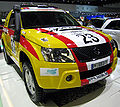2007 Suzuki Grand Vitara Owner's Manual - Page 176
2007 Suzuki Grand Vitara Manual
Page 176 highlights
INSPECTION AND MAINTENANCE Battery EXAMPLE WARNING To avoid harm to yourself or damage to your vehicle or battery, follow the jump starting instructions in the "EMERGENCY SERVICE" section of this manual if it is necessary to jump start your vehicle. Fuses Your vehicle has three types of fuses, as described below: Main Fuse - The main fuse takes current directly from the battery. Primary Fuses - These fuses are between the main fuse and individual fuses, and are for electrical load groups. Individual Fuses - These fuses are for individual electrical circuits. For details on protected circuits, refer to the "FUSES AND PROTECTED CIRCUITS" section in this manual. WARNING Battery posts, terminals and related accessories contain lead and lead compounds. Wash hands after handling. Your vehicle is equipped with a battery that requires infrequent maintenance. You will never have to add water. You should, however, periodically check the battery, battery terminals and battery hold-down bracket for corrosion. Remove corrosion using a stiff brush and ammonia mixed with water, or baking soda mixed with water. After removing corrosion, rinse with clean water. The test indicator on the top of the battery provides information on the condition of the battery. If your vehicle is not going to be driven for a month or longer, disconnect the cable from the negative terminal of the battery to help prevent discharge. 60A269 WARNING Batteries produce flammable hydrogen gas. Keep flames and sparks away from the battery or an explosion may occur. Never smoke when working near the battery. WARNING When checking or servicing the battery, disconnect the negative cable. Be careful not to cause a short circuit by allowing metal objects to contact the battery posts and the vehicle at the same time. 9-35
















